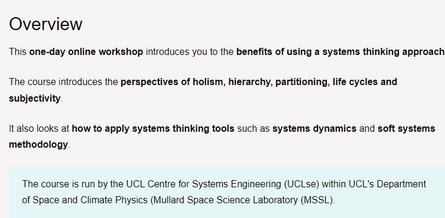
Course structure
The workshop will be held online, from 9am to around 4:30pm, with four blocks of interactive lectures and group exercises.
It's run regularly throughout the year.
Background to systems thinking
How many systems have you used today since getting up? Have you travelled? Made phone calls or sent emails? What about banking, shopping or going to the doctor's?
We spend our lives interacting with all kinds of systems, which are often complex mixes of technology and people. How can we use them as effectively as possible?
We can start by understanding them better, though this is often easier said than done - which is where systems thinking approaches come in.
Instead of looking at the parts of the system each in isolation (a reductionist approach) systems thinking helps us understand behaviour emergent from component interactions.
Even in a simple system there can be a number of subtle cause-and-effects that we have to deal with if we want to change or improve things. Learning about systems thinking means learning about these behavioural properties and characteristics.
It gives you a framework to help make sense of complexity - to analyse the system, understand it better and to make changes that improve its effectiveness.
Learning outcomes
This course will help you be able to:
understand and discuss the properties of systems
classify systems against a range of criteria
understand and discuss the principles of systems thinking
apply a number of techniques to understand systems in a holistic way